|
Need Help?
|
|
Call
1-800-372-3706
to
speak to a Veterinary Behavior Technician |
|
Paws To Speak!
Member
Main Menu
|
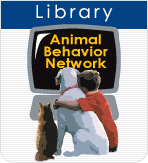 |
|
Help is at your
fingertips by library, email and
phone. |
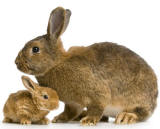
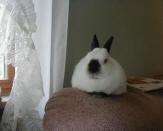
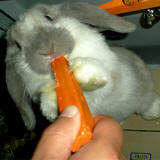
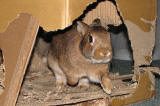
|
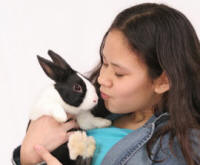
Have you heard the business expression, "What gets rewarded, gets repeated?" Well, this could not be more true for your rabbit. The problem is humans don't always realize what behaviors they are rewarding, some of them may be unwanted behaviors.
Rabbits are cute and adorable and they are not typically known for manipulating their owners. That being said, it is still easy to reward poor behaviors such as trying to jump off your lap, biting, or chewing items that it should not be.
For example, your rabbit scratches at the pen door and
you let your rabbit out. Who told who what to do? As soon as your rabbit
learns a behavior makes you respond, this behavior will endure. You
might only give your rabbit the "evil eye" but this is reward enough. Have you
heard the expression used in child rearing, "Negative attention is
better than no attention?" Welcome to your Pet's
world!
So, you must be VERY careful what attention you give to
your Pet's unwanted behavior and be VERY consistent in giving attention
to those desirable behaviors you want to see endure.
Here's another example of how we confuse our Pets:
Your
rabbit
chews the leg of the chair and you yell, "No!"
In response, your rabbit stops on a dime and looks at you. Instead of
saying, "Good Boy!" for this wonderful response, you say, "Bad rabbit,"
because you are still stuck on the rabbit destroying furniture - which has stopped.
Ooops! You have just
reprimanded your rabbit for
stopping and looking at you.
When you respond after the fact, you treat rabbits like
humans who understand a lecture on what
they did. Your rabbit only learns from the cause and effect of the present
moment so be careful what you teach!
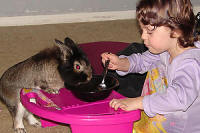
What to do
Verbal praise and treats should be offered when your rabbit is doing something you like such as being calm and quiet on your lap or chewing on approved items.
Punishment Options
In psychology, punishment is the reduction of a behavior via a stimulus which is applied or removed. Thus you can have positive punishment or negative punishment. An example of negative punishment is taking away your attention when your rabbit plays too rough. An example of positive punishment would be yelling at or spraying with a water bottle. Rabbits can be very timid since they are prey animals. So we suggest you only use only negative punishment and positive reinforcement when working with your rabbit. No physical (positive) punishment should EVER be used. Physical punishment and raised voices will only result in a scared Pet and scared Pets can become aggressive and fearful. Treat your rabbit with kindness and a comforting voice and you will be rewarded with a Pet that is comfortable being around you and others.
Why is my bunny wiggling his nose?
Great question! Your rabbit is probably doing more than one thing with his wiggly nose. The first thing your rabbit may be doing is expanding his nostrils so he can breathe better. Your Pet also may be activating the mucous membranes to release moisture which helps him to smell better. Tomorrow's nose wiggle may come from a desire to stay cool. Rabbits use faster breathing to cool down since they only perspire from their foot pads and their ears. When temperature increases, they work harder to cool down thus they are breathing heavier and their noses wiggle! Finally, keep an eye out for a stressed bunny. Rabbits that are calm and secure have slower breathing patterns than those who are anxious or scared. Keep these things in mind the next time you see a wiggly nose!
|